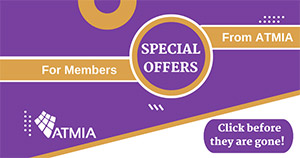Loading...

IAD SURVEY
ATM Industry Association and Kahuna ATM Solutions, conducted the 5th annual IAD survey which covered topics of importance to ATM deployers including: legislative and compliance challenges, competitive threats, migration to EMV, mobile/contactless payments, ATM product and service trends and the future of ATM businesses in the United States.
Despite a myriad of challenges facing U.S.-based independent ATM deployers (IADs) — EMV migration, reductions in interchange and quickly changing technology, to name a few — the majority of IADs say they plan to grow their business over the next 12 months for the 92 respondents, U.S.-based independent ATM deployers (IADs), according to a recent survey.
ATMIA is leading the way on several of the top concerns listed in the survey with our members and our working committees. Below are just a few highlighted in the survey. To learn more, contact David Tente, Executive Director - US at [email protected] or +1.407.833.7906.
Interchange Reduction
Fluctuating reductions in interchange — implemented over time by the card networks to appease card issuers — is an issue ATMIA has been focused on for some time.
“ATMIA is working with the card networks to resolve the balance between supporting the needs of the issuer and the needs of the acquirer,” says ATMIA executive director David Tente. “ATMIA supports variable surcharging — it is good for competition and good for the consumer. It provides ATM deployers with incentives that result in more choices for the ATM user and the convenience of an ATM in many locations that might not otherwise be served.”
The survey also showed that ATM deployers (40.7 percent) favored empowering an ATMIA committee to negotiate with the networks over falling interchange. Thirty-six point one (36.1) percent of respondents favored filing and/or supporting a lawsuit against the networks and 12 percent favored asking Congress to pass legislation that forces networks to make changes to the rules that restrict differential surcharging.
Further Information: ATMIA has further information on interchange on our website available to ATMIA members. Reminder: ATMIA members will be prompted to login.
EMV & Mobile Payments
In the middle of the nationwide Americans with Disability Act (ADA) upgrade, Visaannounced plans to speed up chip migration and adoption of mobile payments in the United States in mid-2011. This announcement was followed quickly by EMV initiatives from MasterCard and Discover.
The survey found that complying with EMV migration deadlines was a major concern for IADs with 50 percent* of respondents indicating it is one of their biggest legislative / compliance / network fears, worries or concerns.
“For ATMIA membership as a whole, EMV migration is our number one issue. Since the majority of EMV discussions are centered on retail point-of-sale, we are finding it necessary to be very proactive about assuring that the unique needs of the ATM industry are made part of those discussions,” says Tente. “To that end, ATMIA is taking the lead in forming an ATM Working Committee within the EMV Migration Forum (EMF).”
The survey revealed that IADs are anxious to find out more about EMV and what it means for the industry. Sixty-four point four (64.4) percent of respondents would like more information on the U.S. EMV requirements, 62.6 percent are interested in what the cost involved with EMV migration will be and 40.1 percent would like to know what the implications of Visa/MasterCard's liability shift will be on the ATM industry.
The survey also found that IADs are unsure about adopting Near Field Communications (NFC) — which drives contactless/mobile payments — as part of their EMV-migration strategy. An overwhelming 63.9 percent of respondents were unsure if they would adopt it while 20.3 percent indicated they would not include NFC. Furthermore, the survey suggests that IADs need more education about NFC; how it works, it’s effects on ATMs and the benefits of NFC to IADs.
Further Information: ATMIA has conference presentations and webinars on EMV available and an EMV committee for ATMIA members. Reminder: ATMIA members will be prompted to login.
ADA Lawsuits
The possibility of seeing another surge in lawsuits against IADs during 2013 over ADA compliance came in as the third biggest legislative / compliance / network fears, worries or concerns for IADs with 41.6 percent* of respondents.
Since the March 15, 2012 deadline, financial institutions and IADs have seen an uptick in lawsuits for non-compliance with ADA regulations at ATMs. One visually impaired woman from Texas has already filed 19 lawsuits for failure to comply with ADA regulations and a blind man in Pennsylvania has filed at least 20 ADA-related suits.
“ATM deployers need to be very diligent about compliance with the new regulations. Although ATMIA has not been made aware of any frivolous ADA lawsuits, there will continue to be ‘serial’ plaintiffs who seek out even the smallest infraction. Changes in the regulations to allow for correction of most infractions before litigation can begin, would be a welcome revision,” says Tente.






































